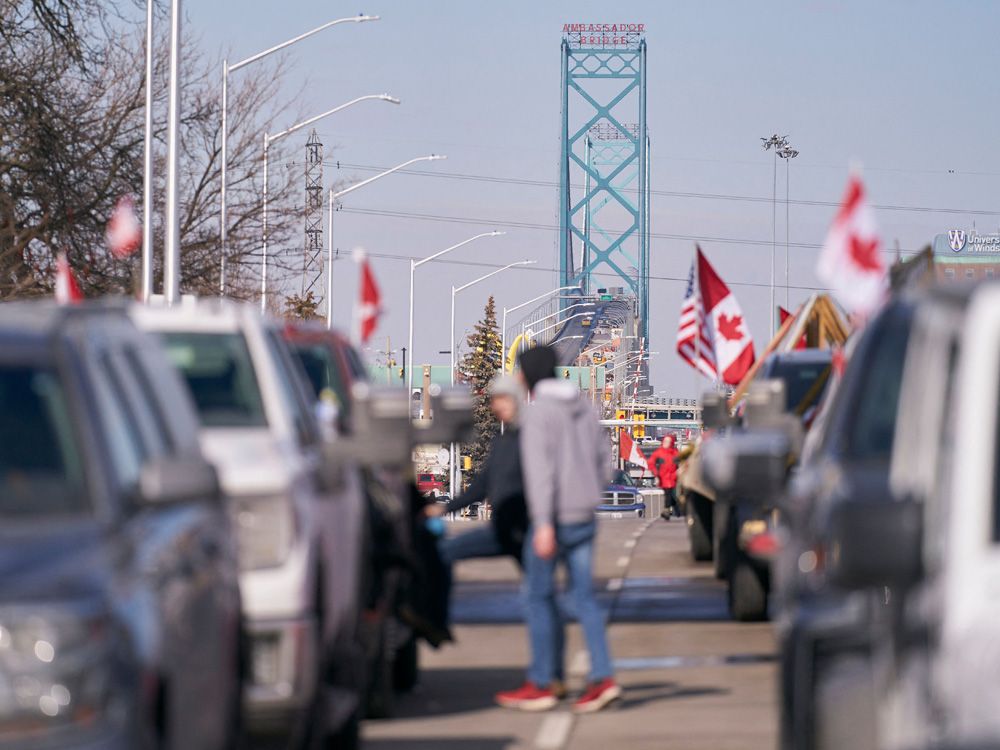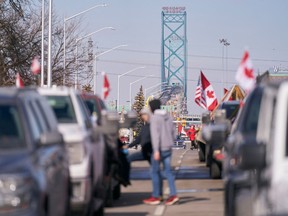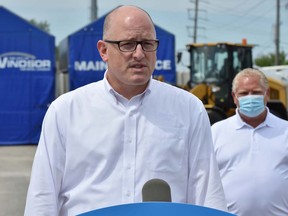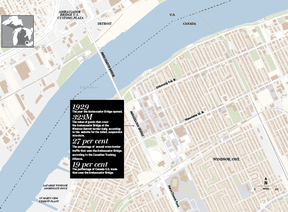Ambassador Bridge blockade spells trouble for grocers, greenhouses

Domestic food manufacturers depend heavily on U.S. suppliers for the ingredients and packaging they use to make their products

Article content
The mayor of Windsor, Ont. seemed perplexed. On Wednesday, he was announcing his formal request for police reinforcements from the federal and provincial governments to help manage the Ambassador Bridge blockade. The plan, he said, was to reach a peaceful resolution with the protestors who have shut down a crucial trade crossing into the United States, though he wasn’t exactly clear on how that would happen.
Advertisement
Story continues below
This advertisement has not loaded yet, but your article continues below.
Article content
“You’re dealing with a bit of a leaderless group,” Mayor Drew Dilkens said at a mid-day news conference with the city’s police chief. “It’s not like there’s one person you can go to and try and find a resolution.”
Authorities have been under pressure to clear the protest and restore the flow of trucks between Windsor and Detroit — a border that the mayor said makes up roughly one third of the surface trade between Canada and the U.S., with around $400 million in goods crossing daily.
Bank of Canada Tiff Macklem joined a chorus of leaders that have been pushing for an end to the blockades, warning that protests at trade arteries in Western Ontario, as well as similar actions in Alberta, could have a “measurable” impact on economic activity if they don’t soon end.
Advertisement
Story continues below
This advertisement has not loaded yet, but your article continues below.
Article content
“We don’t need this,” he told reporters on Wednesday, after speaking at a virtual conference hosted by the Canadian Chamber of Commerce. The chamber is leading a coalition of more than 70 business groups calling for the municipal, provincial and federal governments to clear the protests.
For Mayor Dilkens, though, it isn’t that easy. “It may be gratifying for some to see the forced removal of the demonstrators,” he said, but those aggressive tactics risk enflaming the situation and inspiring more people to turn out in support of the protesters. As of Wednesday morning, police estimated the size of the protest at roughly 100 people, plus 50 to 75 vehicles.

“You’re trying to have a rational conversation and not every person on the ground is a rational actor,” Dilkens said. “I hear that you want this to end and you want these people to go away. And so do we. So allow us to sensibly work through this so nobody gets hurt.”
Advertisement
Story continues below
This advertisement has not loaded yet, but your article continues below.
Article content
If that process drags into next week, trucking delays could impact production in the major local industries, including automobile manufacturing and food production. Nearby Leamington, the Canadian greenhouse capital, grows more than the domestic market demands, and ships roughly 80 per cent of its cucumbers, peppers and tomatoes into the United States.
Michael Graydon, CEO of Food, Health and Consumer Products of Canada, said domestic food manufacturers depend heavily on U.S. suppliers for the ingredients and packaging they use to make their products. Factories were already running low on those inputs because their suppliers struggled with labour shortages and production interruptions during the Omicron wave.
Advertisement
Story continues below
This advertisement has not loaded yet, but your article continues below.
Article content

Most manufacturers will have enough inputs for the next few days, Graydon said. If the blockade extends into next week, however, “some of our members will in fact likely have to close down.”
About 25 per cent of Canada’s food and consumer products cross the Ambassador Bridge from the United States, and an extended blockade could lead to “reduced on-shelf availability and increased pricing for many products like fruits and vegetables,” according to Retail Council of Canada spokesperson Michelle Wasylyshen.
The blockade comes at a fragile time in the global supply chain, already stretched beyond its limits by a long series of weather and complications related to the pandemic, from Omicron-fuelled labour shortages to the catastrophic B.C. floods late last year.
Advertisement
Story continues below
This advertisement has not loaded yet, but your article continues below.
Article content
Importers who are responsible for Canada’s winter supply of fruit and vegetables have been struggling to find enough ships and trucks to transport product from warmer growing regions — most of which eventually crosses the U.S. border.
-

Today’s coverage of the Ambassador Bridge blockade and COVID protests across Canada
-

How the Ambassador Bridge protest could tighten the supply-chain chokehold
-

Driver vaccine mandates haven’t snarled cross-border flow of goods, top trucking firm says
“I’m going nuts. I’m going crazy,” said Sandro Saragiotto, president of the Toronto-based transport company Offshore Canada Logistics Inc., which focuses on perishables. “This is not right.”
The Ambassador Bridge shutdown has added up to 24 hours to the time it takes to ship across the border, on average, as trucks try to find alternate routes, according to Ron Lemaire, who heads the Canadian Produce Marketing Association (CPMA). At this stage, 24 hours can be the difference between sellable and rotten, since shipments of fresh fruit and vegetables have already been running late due to issues in the supply chain.
At the Summerhill Market chain of four high-end grocery stores in Toronto, vice-president Christy McMullen hadn’t seen any impacts from the blockage. But she was bracing for it on Wednesday, expecting some of her suppliers to be behind on shipments. That would lead to what she called “holes” on shelves, the sort of rolling outages where on produce is gone one day, but back another.
“It’s coming,” she said.
• Email: [email protected] | Twitter: jakeedmiston
Advertisement
Story continues below
This advertisement has not loaded yet, but your article continues below.








